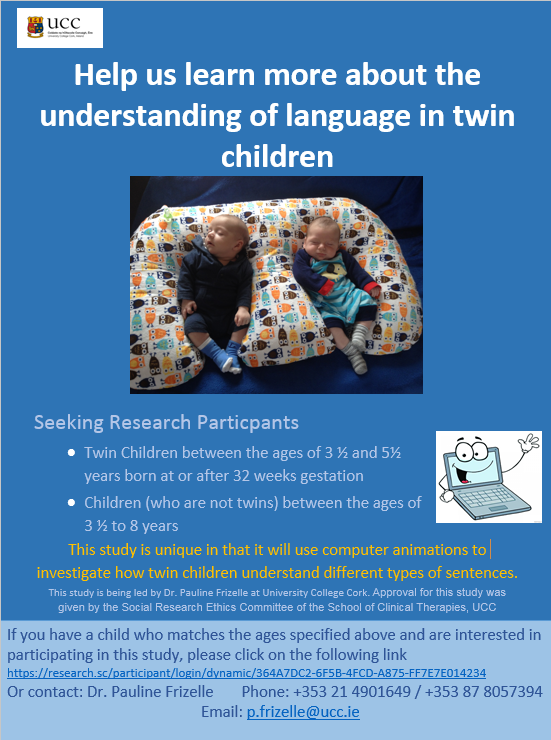Purpose of the Study
The focus of this study is to examine the understanding of complex sentences in twins versus non-twins, between the ages of 3 ½ and 5½ years. We are also recruiting a group of non twin children up to 7 years 11months (not yet 8). Complex sentences are those in which one sentence (such as the cup fell) is embedded in to another, as in the sentence (The girl picked up the cup that fell). Complex sentences form part of all of our conversations as we progress through school. From preschool onwards children engage in conversation, tell short stories and explain what is happening using these types of sentences. But the pattern of typical development may be different for twins when compared to non-twin children.
What will the study involve?
The study will involve three short simple tasks to be completed by the parent (taking approximately 15 minutes in total) and 2 tasks taking around 40 minutes in total to be completed by the child. The tasks can be carried out on a computer in your own home. Your child will be asked to look at some pictures, point to some animations and carry out a problem solving task. In these tasks we are looking at what children find easy and more difficult to understand.
Why is this information relevant to you?
We have sent this information to a number of multiple births associations and parenting websites because we are looking for twins between the ages of 3 ½ and 5½ years who were born at or after 32 weeks gestation. We are also looking for non twin children up to 7 years 11 months (not yet 8).
Is there an expectation that you should take part?
Participation is completely voluntary. If you would like your child to take part in the study we would be very grateful if you could click on the following link, which will direct you to a consent form Click here. Once you have given consent you can then continue with the on-line tasks and complete the study.
Will your participation in the study be kept confidential?
All data collected and used in the study will be entirely anonymous, therefore no clues to your child’s identity will appear in the study.
What will happen to the information that you give?
We will use Gorilla (www.gorilla.sc) to collect data for our study (a cloud software platform specifically for the behavioural sciences), hosted on Microsoft Azure in the Republic of Ireland. Each person will be assigned a code so that no identifying information will be used. Encrypted anoynmised data will be stored on the Gorilla servers - see see https://gorilla.sc). A copy of all the anonymised data will also be stored locally on a hard drive locked in a filing cabinet at UCC. On completion of the project, the anonymised data will be made available on the Open Science Framework.
Are there any disadvantages to taking part?
We don’t envisage any negative consequences for you in taking part. As a parent of twins we appreciate that you are very busy and this project will take approximately 20 minutes of your time and a further 30 minutes with your child (approximately). Your contribution would be greatly appreciated and will help profile typical language development in young twins. This will help reduce un-necessary referrals to speech and language therapy services which will allow more time for those who genuinely need it.
Who has reviewed this study?
The Social Research Ethics Committee for clinical therapies, UCC has approved this study.
To participate in the study click here
https://research.sc/participant/login/dynamic/364A7DC2-6F5B-4FCD-A875-FF7E7E014234
Further information
For further information, please contact:
Dr. Pauline Frizelle, Email: p.frizelle@ucc.ie
Contact number for Dr. Frizelle 00353 21 4901649

